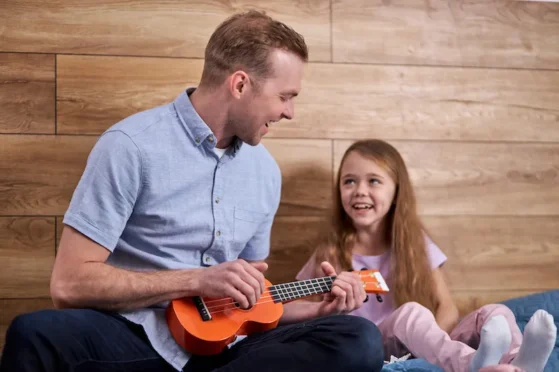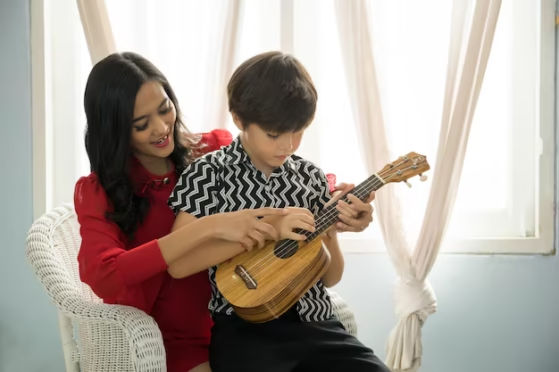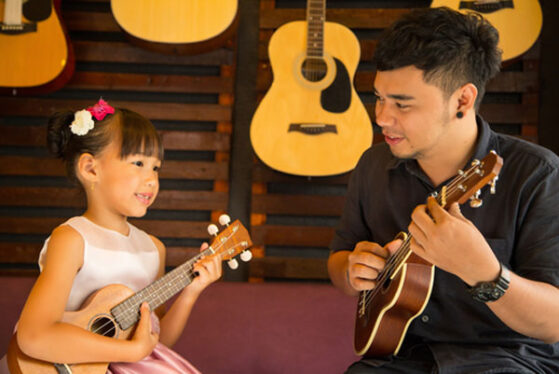The Benefits of Learning Ukulele for Kids and Adults
The ukulele, with its sweet, mellow sound and compact, inviting design, is far more than a charming Hawaiian symbol. It is a gateway into the world of music for beginners and a refreshing creative tool for experienced musicians. The benefits of learning ukulele extend far beyond playing music—it boosts creativity, builds confidence, and brings people together. Over the past few decades, the ukulele has enjoyed a remarkable resurgence worldwide, appearing in classrooms, living rooms, coffee shops, and concert stages.
Whether you are a child picking up your very first instrument or an adult searching for a fulfilling hobby, the ukulele offers benefits that extend far beyond its strings. It’s affordable, portable, beginner-friendly, and full of musical possibilities. Most importantly, it offers emotional, cognitive, and social rewards for players of all ages.
In this detailed guide, we’ll explore why learning the ukulele is such a powerful experience for both kids and adults, and how it can enrich your life in ways you may never have imagined.

A Gentle Introduction to Music
The ukulele is one of the easiest instruments to begin with. It’s simple to learn but still feels like a real instrument. The soft nylon strings are gentle on the fingers. The close fret spacing makes chords easier to reach.
These features make starting less intimidating. They also make playing more enjoyable from day one.
For kids, this means less discomfort and faster progress. In just a few lessons, they can play a simple tune like “Twinkle, Twinkle Little Star.” Early wins like this keep them excited to learn more.
For adults, the appeal is quick results. Many instruments take weeks before they sound good. With the ukulele, you can enjoy music almost immediately.
This instant satisfaction builds momentum. One song naturally leads to another. Before long, playing becomes part of your daily routine. That routine is the key to steady, lasting growth.

Affordable and Accessible to Everyone
Learning an instrument shouldn’t feel financially intimidating, and the ukulele removes that barrier. It’s one of the most affordable instruments, with quality beginner models costing far less than a guitar, piano, or violin.
Accessibility isn’t just about price—it’s also about availability. Ukuleles are easy to find online and in music stores, so getting started is simple.
They also come in sizes to suit different players:
Soprano – Smallest, bright tone, ideal for kids.
Concert – Slightly bigger, fuller tone.
Tenor – Richer sound, great for adults.
Baritone – Deeper tone, close to guitar.
This variety makes it easy for anyone to find a comfortable fit, helping new learners start with confidence.

Portability That Encourages More Playing
One of the key benefits of learning ukulele is its compact size, which makes it one of the most portable instruments in the world. It fits effortlessly into a small bag or backpack, so you can take it almost anywhere without inconvenience. This travel-friendly nature encourages more frequent practice and spontaneous playing—whether you’re heading to school, a picnic, a music class, or even on vacation.
For kids, it’s light enough to carry to school for music class, talent shows, or even a show-and-tell session, giving them opportunities to share their music and build confidence.
For adults, it’s just as easy to bring along to picnics, beach outings, camping trips, or family gatherings—ready to spark sing-alongs and create spontaneous moments of joy.
Because it’s so easy to transport and set up, the ukulele naturally invites more frequent playing. You’re far more likely to pick up an instrument that’s lightweight and ready to go, rather than one that demands heavy lifting, special storage, or a dedicated setup. Over time, this convenience plays a huge role in skill development and consistent practice.

Improves Coordination, Motor Skills, and Brain Development
Playing the ukulele blends creativity with coordination. The fretting hand forms chords, applying just enough pressure for clear notes. The strumming hand keeps the beat, adding rhythm and style.
These two actions work together in harmony, engaging both mind and body. For children, this builds fine motor skills used in handwriting, sports, and everyday activities. It also teaches the brain to manage different tasks at the same time, improving focus and attention.
For adults, the benefits are just as valuable. Regular playing keeps hands flexible and responsive. It also stimulates the mind, helping to maintain sharpness and slow the effects of aging on motor skills. In every chord, there’s both music and mental exercise—a combination that makes the ukulele rewarding at any age.

Strengthens Cognitive Skills and Academic Performance
The benefits of learning ukulele extend far beyond simply making music. Playing engages both sides of the brain at the same time, creating a unique mental workout. The left brain focuses on logic—chord shapes, timing, and counting beats—while the right brain brings in creativity, melody, and emotion. This interaction keeps the mind active and balanced. It also strengthens memory, sharpens focus, and improves problem-solving skills. Whether for kids building learning foundations or adults looking to keep their minds sharp, the ukulele offers both creative joy and cognitive growth.
These two sides work together in harmony, and the effect is powerful. Children see improvements in memory, pattern recognition, and problem-solving. These skills often show up in better performance in math, reading, and other subjects.
For adults, the ukulele is more than music—it’s brain training. Each chord change sharpens focus. Memorizing songs strengthens short-term memory. Playing and singing together builds multitasking skills. Over time, the mind stays quick, adaptable, and alert.

Sparks Creativity and Encourages Self-Expression
The ukulele isn’t just an instrument for playing songs—it’s a canvas for storytelling and emotional expression. With just a handful of chords, you can begin crafting your own melodies, improvising playful tunes, or adding gentle accompaniment to your singing.
For children, it becomes a joyful language all its own—a way to express feelings they may not yet have the words to describe. Through strumming and singing, they learn to communicate emotions in a safe, creative way.
For adults, the ukulele offers a welcome release from life’s pressures. Whether channeling stress into a calming melody or pouring joy into an upbeat rhythm, playing becomes a deeply personal form of self-care.
In both cases, the creative process is as rewarding as the music itself—therapeutic, liberating, and infused with the simple happiness of making something uniquely yours.

Builds Social Bonds and Community
One of the ukulele’s greatest strengths is its ability to bring people together. Its warm, cheerful sound seems to naturally draw in listeners and inspire sing-alongs, making it a perfect social instrument.
For children, the ukulele can open doors to group experiences like school ensembles, talent shows, or community music classes—helping them make friends and develop teamwork skills through shared musical goals.
For adults, it creates opportunities to join local ukulele clubs, participate in open mic nights, or simply gather with friends and family for casual jam sessions. These shared moments of music-making often spark meaningful conversations and strengthen relationships.
In a world that can sometimes feel disconnected and fast-paced, playing the ukulele with others offers a sense of belonging and joy that is both grounding and deeply fulfilling.

Encourages Confidence Through Achievable Goals
Unlike some instruments that take years of practice before you feel ready to perform, the ukulele offers a much faster path to success. One of the key benefits of learning ukulele is how quickly you can make music you’re proud of. Its simplicity lets learners enjoy small wins early on—strumming a few chords, playing a familiar tune, or singing along within weeks. These early achievements set a positive tone for the entire learning journey, building confidence and encouraging consistent practice.
For children, this quick progress is a powerful motivator. Performing a simple song for parents or classmates becomes a proud milestone. Each achievement builds their confidence, encouraging them to try harder pieces and take on new challenges both in music and in life.
For adults, especially those starting fresh or returning after years away from music, the ukulele feels inviting rather than intimidating. Even learning a few songs boosts self-esteem and renews their belief that learning something new can be fun, rewarding, and achievable.
These early wins keep learners engaged. They turn curiosity into consistent practice, and consistent practice into a true love for music. Over time, the ukulele becomes more than an instrument—it becomes a companion in a lifelong musical adventure.

Relieves Stress and Promotes Emotional Well-being
Music has long been associated with emotional well-being, and the ukulele’s gentle, melodic tone makes it uniquely comforting. The moment your fingers brush across its strings, the warm resonance invites a sense of calm. Just a few minutes of playing can ease tension, quiet anxious thoughts, and lift your mood.
For children, this can be especially powerful. Their boundless energy often needs a creative outlet, and music provides exactly that. Strumming and singing allow them to express feelings they might not yet have the words for, turning frustration into creativity.
For adults, the ukulele offers something equally valuable—a mindful pause in a fast-paced life. Concentrating on chord changes, rhythm, and melody gently draws your focus away from daily worries, much like a moving meditation. The act of playing becomes not just about producing music, but about finding stillness in motion.
Over time, the ukulele transforms into more than just an instrument. It becomes a personal sanctuary in your hands—a portable source of peace, joy, and emotional renewal that you can turn to anytime life feels overwhelming.

Lifelong Musical Possibilities
The ukulele may be small, but its versatility is remarkable. From cheerful folk tunes to soulful blues, upbeat pop hits to sophisticated jazz, and even intricate classical pieces—it adapts beautifully to almost any musical style. You can enjoy it as a solo instrument, use it to accompany your singing, or blend it seamlessly into a band or ensemble for richer arrangements.
This adaptability also makes it an excellent stepping stone to other string instruments. Many of the chord shapes, strumming patterns, and rhythm skills you master on the ukulele translate directly to the guitar and other fretted instruments. This means that once you’ve built a solid foundation on the ukulele, transitioning to a guitar or exploring more complex stringed instruments becomes a smoother and more enjoyable journey.

Final Thoughts
The ukulele is more than just a cheerful four-stringed instrument—it’s a doorway to the many benefits of learning ukulele, from sparking creativity to building connections and encouraging personal growth. For kids, it can be the perfect first step into the world of music, helping them develop cognitive skills, boost confidence, and nurture a lifelong love for the arts. For adults, it offers a relaxed, joyful way to learn, express themselves, and find calm in their daily lives.
At The Mystic Keys, our Ukulele Lessons Online make this journey simple and enjoyable. With flexible scheduling and beginner-friendly teaching methods, we help students of all ages start playing from day one. Whether you’re completely new to music or returning to it after years, our lessons guide you every step of the way.
Because the ukulele is affordable, accessible, and versatile, it remains one of the most rewarding instruments to learn. And the best part is, you don’t need to wait years to feel the joy of playing—you can start making music almost immediately.
So why wait? Pick up a ukulele, join our online lessons, and experience firsthand how this small instrument can bring big changes to your life.
For more information and exciting resources about learning music, visit our website at The Mystic Keys. For more music content and exciting offers follow us on
Facebook, Instagram, YouTube, LinkedIn, Twitter, Pinterest, and Threads,








